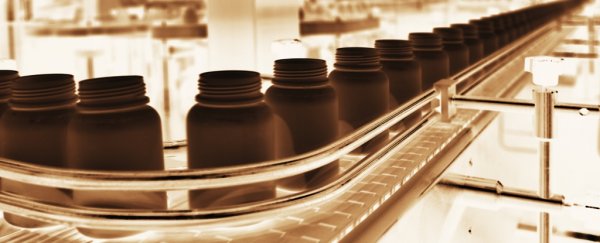The labels promise miracles: Fast Weight Loss! Eliminates Hunger! Burns Calories!
Now new research highlights how hundreds of brands of dietary supplements deliver so much kick from a modest blend of vitamins and herbs. The answer is many labels leave out one important ingredient: a hidden payload of pharmaceutical drugs and experimental chemicals.
A new analysis of 10 years of FDA records reveals that from 2007 to 2016, almost 750 dietary supplements were found to be contaminated with secret doses of totally unregulated drugs, including prescription medicines, banned and unapproved chemicals, and designer steroids.
Over 20 percent of these offending products contained more than one unapproved drug ingredient, and numerous contained a cocktail of clandestine chemicals – in two cases, as many as six unlisted ingredients.
For a US$35 billion industry patronised by about half of American adults, it's possible this data could be just the tip of the iceberg, too.
"The drug ingredients in these dietary supplements have the potential to cause serious adverse health effects owing to accidental misuse, overuse, or interaction with other medications, underlying health conditions, or other pharmaceuticals within the supplement," researchers from the California Department of Food and Agriculture, Sacramento, explain in their paper.
Given that supplement use is associated with some 23, 000 ER visits and 2,000 hospitalisations in the US each year, it's clear we're looking at a big problem here, but what's even more shocking than the brazen selling of these illicit additives is how tame and toothless the FDA's official actions were.
Of 746 products identified as adulterated by the FDA, just 360 (48 percent) were subsequently recalled, leaving more than half of the contaminated supplements available for sale.
"The agency's failure to aggressively use all available tools to remove pharmaceutically adulterated supplements from commerce leaves consumers' health at risk," writes general internist Pieter Cohen from Harvard Medical School in a commentary on the new research.
Many of the tainted supplements analysed in the study contained sildenafil (the active ingredient of Viagra) to boost their powers of sexual enhancement. Another erectile dysfunction drug, tadalafil, was also common.
Other chemicals included hidden antidepressants, a withdrawn weight loss drug called sibutramine, and undeclared anabolic steroids or steroid-like substances.
It's been argued however that since almost 75 percent of the offending supplements were sold online or through international mail order, they don't represent the 'mainstream' of the supplements industry.
"These come from dark corners of the internet," president of the Natural Products Association, Daniel Fabricant, told the San Francisco Chronicle.
"They're not what you get at your health food store."
Still, given that none of these products are actually subjected to the same stringent tests reserved for pharmaceutical drugs, it's possible any supplement could contain anything – which is why Cohen advises choosing products that only contain a single ingredient and avoiding products that purport to offer spurious, medical-sounding benefits.
Why? Because as this research shows, many supplements turn out to be medicine after all – only it's an unknown drug, potentially a banned one, and there's no way of measuring your dose.
"If the company is saying it works like Viagra or you're going to gain muscle like you're on steroids – that's not a supplement. That's a drug," Fabricant says.
"Dietary supplements are meant to maintain health, not to take 30 minutes before sex."
The findings are reported in JAMA Network Open.
